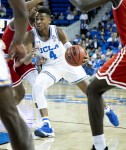The Bruins will have an opportunity to break a three-game losing streak when it faces the Hoosiers on Sunday.
UCLA women’s basketball (3-4) will host Indiana (6-0) – the 2018 Women’s National Invitation Tournament champions – after returning home winless from the U.S. Virgin Islands Paradise Jam. Indiana will be the third undefeated opponent UCLA has faced this season.
Coach Cori Close said the key to victory Sunday will revolve around the 3-point shot.
“That’s really going to be the key,” Close said. “If we can do a great job chasing them off the 3-point line.”
The Hoosiers have shot a combined 51.1 percent from the field and have shot 21-of-43 from beyond the arc in their last three games.
“It’s going to be key for us to know who the shooters are and where they are,” said sophomore forward Lauryn Miller. “(We need to be) defensively locked in to make sure we don’t let them hit the mark they’ve been hitting.”
Indiana guard Ali Patberg is the Hoosiers’ top scorer and rebounder, averaging 17.8 points and 6.8 rebounds per game. Patberg scored a career-high 30 points on 8-of-11 shooting in the Hoosiers’ victory over the Wake Forest Demon Deacons on Wednesday.
For the Bruins, redshirt freshman guard Lindsey Corsaro has shot 21.4 percent from the field in the last four games.
Corsaro said she is looking forward to the matchup with Patberg, the Notre Dame transfer .
“(Patberg) is really good at getting downhill and to the basket,” Corsaro said. “She’s really aggressive and strong. It’ll be a good battle and be fun to see us go head-to-head with her.”
Defensively, Indiana has allowed its opponents to shoot roughly 23 3-point attempts per game with a 32.1 percent success rate.
“We’ll definitely look to keep exploiting (the 3-point shot),” Miller said. “If there are inside looks, we’ll definitely go to them. But whenever the 3 is open, that’s what we’re going to attack.”
Close said she expects Indiana to give the UCLA more 3-point opportunities.
“Kentucky went out and pressured us, and South Florida backed off and sat in the paint,” Close said. “We struggled a lot more with (USF) sitting in the paint. If I’m predicting, (Indiana is) going to try to make us prove it and make jump shots from the outside.”
The Bruins had 48 points in the paint against the Wildcats – the most in a game this season. Meanwhile, UCLA shot a season-low 2-of-19 from 3 against USF.
Close said she wants the team to moderate its shot selection.
“I don’t want our team to rise and fall by whether or not we make 3s,” Close said. “We don’t want to shoot 20-plus 3s a game. We want to shoot maybe 11 or 12 really good ones.”
The Bruins will enter Sunday shooting a Pac-12-worst 21.8 percent from 3.
Close said she will address the offense’s shooting flaws by gaining more possessions.
“We’re not a great shooting team, so you have to get more possessions,” Close said. “There are two ways you can get more possessions: you can turn people over or you can get more rebounds.”
UCLA averages 19 offensive rebounds per game – good for eighth-best in the country.
“Offensive rebounding – I’m actually very pleased with where we are,” Close said. “If we can get 10 more shots on the goal, I think that’s to our advantage.”
The Bruins will take on the Hoosiers on Sunday at 1 p.m. in Pauley Pavilion.






